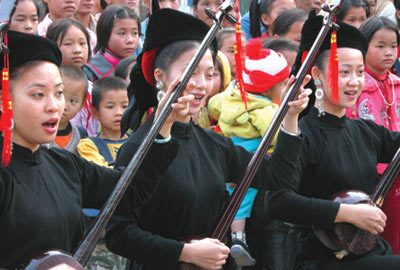
The Sound of Strength
The Zhuang minority have survived centuries of war through determination and song
By Yap Su-Yin
Looking at the simple Zhuang farmer cultivate his rice field with quiet diligence, one can hardly imagine his ancestors as once-fiery warriors, beating back aggressors along China's southern frontiers. Nevertheless, since the 11th century, the Zhuang have left their mark on the battlefield, having repulsed the Annamese in the 1070s, the Japanese in the mid-16th century and French invaders in the 19th century. The Zhuang even participated in China's first democratic revolution of 1911, led by Sun Yat-sen. Many became prominent members of Tong Meng Hui, an organization started by Dr. Sun to advance revolutionary ideals.
The name "Zhuang" means "cave" in the native dialect. According to Zhuang mythology, their community originated from the caves of Mount Ganzhuang ("ganzhuag" meaning "cave dweller") near Tianyang village in southwest Yunnan. The mountain was the fabled home of a demi-god called Buluotuo and his wife Muliujia, who the ancient Zhuang believed created the world. Zhuang legend has it that Zhuang people descended from this couple about four or five millennia ago. At 15.6 million people, this community is China's largest ethnic minority today. They live mainly in southwest China's Guangxi Zhuang Autonomous Region, which has often been compared in size to New Zealand. The rest are scattered in Yunnan, Guangdong, Guizhou and Hunan provinces.
When not fighting for cause or country, the Zhuang - mostly farmers - spent their days tilling their staircase of paddy fields, picking herbs and tending to their crops. Ancient relics uncovered by archaeologists on Mount Ganzhuang in 2002 cast light on their evolution. Graphics of frogs and lightning were featured on some relics. "Both the frog and lightning were special symbols of the ancient Zhuang people," shares Professor Liang Ting Wang, an expert on Zhuang civilization and former vice-president of the Central University for Nationalities in Beijing. Lightning represented fishing and hunting, while the frog design indicated farming. The symbols show ancient Zhuang lifestyle evolved from fishing and hunting to farming, explained Professor Liang.
Till today, the community is mostly reliant on agriculture for its livelihood, although those who live in popular sightseeing areas in Guangxi, such as Guilin, increasingly depend on tourism for their bread and butter. Apart from staples like rice, yam, wheat, sweet potatoes and maize, Zhuang families grow pomelos (a type of grapefruit), mangoes, pineapples, papayas and other subtropical fruits. They have the mild weather to thank for their succulent harvest.
Their terraced hillsides are part of an undulating topography made up of limestone and karst formations. So famous are the mountains in this part of Guangxi that the karst scenery is plastered on the back of China's 20-yuan banknote. Set against this rugged yet verdant landscape are Zhuang homes. Their simple two-storey abodes, called galans, pepper the hillsides. The upper storey is usually the living quarters and the lower level acts as storeroom or animal pen.
|

![]() 北京市通信公司提供网络带宽
北京市通信公司提供网络带宽